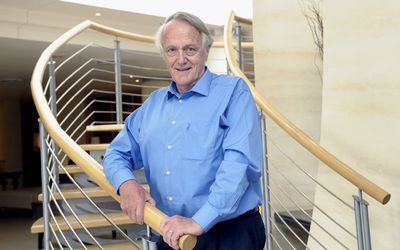CONSERVATION’s biggest challenge is to ensure that politicians and big business properly understand that the economic future depends on protecting the environment and biodiversity, says veteran conservationist John Hanks.
"We need to get across the message that if we don’t do that there is not a single industry that won’t be affected," says Hanks, who is stepping down from the chairmanship of, among other things, the Nedbank Green Trust and the Lapalala Wilderness School to finish writing a book or two.
"Conservation is about biodiversity for sustainable living. If there is no biodiversity, there is no future," he says.
By way of example, Hanks points to the failure of the government and business to grasp properly that biodiversity in South Africa’s water catchment areas is already compromised, affecting the production of the clean water that is essential for life, energy production and industrial processes.
"It (conservation) needs to move right up on the political agenda. It needs to be mentioned frequently in President Jacob Zuma’s state of the nation speech. I read that through and there was no mention at all. We need government commitment to it," he says.
It is just more than 50 years since Hanks, who grew up in England and studied zoology at Cambridge University, travelled out to the Kenyan bush in 1961 on a gap year, after volunteering his services to a newly established organisation called the World Wildlife Fund.
"It was just one man in London. Look at it now," he says. "As soon as I graduated (in 1965) I was back…. It was an interesting time, before independence in many African countries. I’d just finished my first degree and I applied to the British ODA (Overseas Development Administration). They sent me to (Zambia’s) Kafue National Park as a biologist. I was surprised to get the job," he says.
He was awarded his doctorate from Cambridge in 1971, and came to the Natal Parks Board in 1975 after a stint lecturing at the then University of Rhodesia.
Hanks has done battle for the environment and sustainability as an academic, an adviser to several African governments, a journalist and a committee or board member of respected organisations such as the World Wide Fund for Nature — he was CEO of the South African chapter — and the International Union for the Conservation of Nature.
He puts his love of places "where you can’t see another tent" down to the four festive seasons he worked in London’s department store, Selfridges, to aid the funding of his student days. "I worked through the Christmas rush and the New Year sales … such a crush of people. I don’t like crowds. This shirt, all the clothes I have on, are bought by my wife. I’m not a city person, I get out of a city as fast as possible."
Despite this, Hanks has chosen Cape Town as the venue for his self-imposed six-month book-writing sabbatical.
"I lived in Greyton, I wanted a quiet place to work, but you become so involved in community affairs. There were always people knocking on the door, so we moved to Cape Town. It’s quieter, you can disappear," he says. Greyton is a village in the Western Cape mountains.
All over the world the few wild places left are fighting for survival. Even South Africa’s flagship Kruger National Park, which draws about a million tourists a year, is cash-strapped. It receives less and less government funding.
That said, the Treasury last year gave South African National Parks an extra R75m for antipoaching operations, chiefly to combat the escalation in rhino poaching that has seen the numbers killed increase from 2007’s 13 to last year’s 1,004. "It’s a war, a type of economic sabotage," says Hanks.
Rhino poachers, who are after the animals’ horns to sell to buyers in East Asia willing to spend an estimated $60,000/kg because it is seen there as a status symbol and medicine, have turned their AK-47s on South Africa after killing almost all the rhinos in other range states.
Conservationists expect that in their wake will come the elephant poachers who are busily eradicating elephant herds across Africa. Research by the Wildlife Conservation Society shows 62% of central Africa’s elephants vanished between 2002 and 2011.
While these statistics invoke pessimism in many — and have sparked debate on "conservation triage" through which it is mooted that money is put into saving animals only in places with political will and technical capacity — Hanks has hope.
"Youth development, that’s where the future lies.… There are many coming through who have the right attitude and there are some super, super projects taking place," he says.
Hanks has expended time and effort on youth development through the Nedbank Green Trust and GreenMatter, but says South Africa still needs a conservation champion of the order of Kenyan activist Wangari Maathai.
Maathai was awarded the 2004 Nobel Peace Prize for her "contribution to sustainable development, democracy and peace".
"Who is the South African equivalent of Wangari Maathai? She was incredibly brave .… she took environmental activism right the way up politically. We don’t have one," he says.
"Whoever it is, they have to be passionate. We have to get young people to see this is not a nine-to-five job. They have to be passionate and enthusiastic. Enthusiasm is infectious, just as pessimism is."
Hanks says he "hates" pessimistic people, and the fact that newspapers so often concentrate on the bad without showcasing the good.
"You pick up a newspaper and it’s service delivery protests and corrupt municipal officials, and not a word on the good people. There really are fantastic people out there making such a difference."
Hanks says countries such as South Africa also have to put more money into funding protected areas and their proper management, not only to protect rhinos from extinction, but also to protect biodiversity and, through that, essentials such as water and topsoil.
"If you take an A4 piece of paper and hold it up, how long does it take for that much (about 30cm) topsoil to be formed? Seven thousand years. If you get down to bedrock, it’s gone. The threat to our arable land is critical," he says.
Only 12% of South Africa’s landmass is considered arable and only 3% "truly fertile".
Hanks’s passion for the wild, and wild things, began when he was still at school in England and picked up a book called Serengeti Shall Not Die.
After reading the story of the Grizimeks, the father and son who gave up their European life to work with wildlife, he thought, "Gosh, this is what I want to do."
Africa, Hanks says, still offers myriad opportunities to make a difference, in research and beyond.
"I got more and more involved in looking outside the fence. There are opportunities to make a difference that you just wouldn’t have in Europe. There are so many things that still need to be done."
But for now Hanks is taking "a breather" while he attempts to meet a book publisher’s deadline for one book. He says there are others in the pipeline too. He’s not saying what the books are about, except that they are nonfiction and "have a conservation theme".
One wonders how long it will be before there’s yet another knock on his door.

























Post a comment